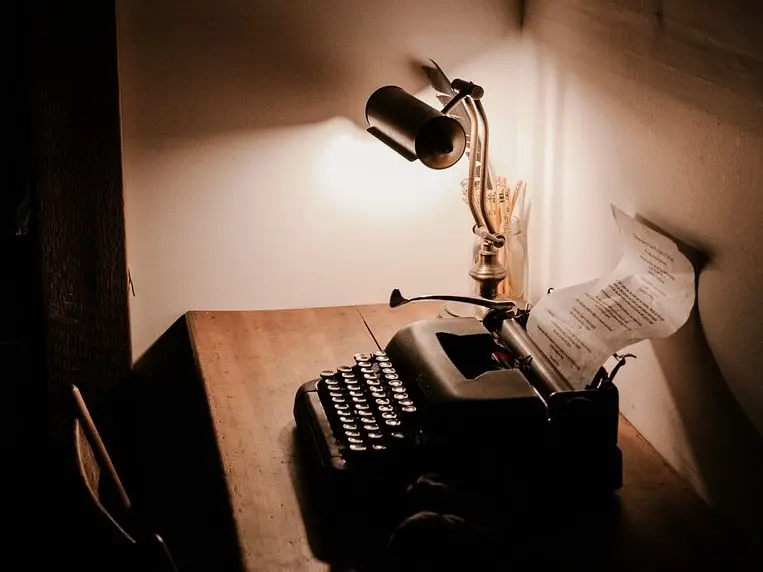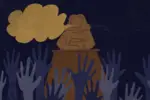In his acclaimed “On Writing: A Memoir of the Craft,” the notoriously prolific novelist Stephen King wrote, “Amateurs sit and wait for inspiration, the rest of us just get up and go to work,” and his writing philosophy is alive and well in Camp NaNoWriMo.
As most published writers — including King — express, there exist two surefire ways to improve your ability to thread words together: reading and writing, and not in small supply, either. They ubiquitously assert that devouring as many books as you can is paramount to achieving greater writing ability. For many budding writers, this is easy. After all, most who pursue an occupation in the written world express a passion for reading. Despite this, the fervent love that some experience while flipping through the pages of a bestseller refuses to translate into original writing.
Fresh-faced writers might fall prey to the trap of hunting for originality before penning their stories down or convince themselves that the grandiose vision in their heads cannot possibly manifest on paper. For these literary voyagers, or any others seeking to wet their feet in the world of stories, I strongly recommend participating in Camp NaNoWriMo.
One of the writing competitions hosted by the National Novel Writing Month organization, Camp NaNoWriMo is a writing extravaganza that occurs twice a year during the months of April and July. Unlike November’s main course NaNoWriMo event, these side dish camps feature far less stringent rules. Instead of a set 50,000 word goal, Camp NaNoWriMo encourages participating writers to choose a word count anywhere between “30 and 1,000,000” words, which is a perfect opportunity for emerging writers to practice creating under a no-risk deadline — a chance that they probably will not be able to enjoy elsewhere.
Whispers of doubt might have snuck into the debilitating shadows of your brain, hopeful writer, so allow me to shoo them away. First of all, to any young writers who are seeking to sample the fruits of original literature, fret not; although the upcoming April competition has a minimum age of 13, the NaNoWriMo organization also runs a Young Writers Program for ages 17 and younger.
Some of the savvier wordsmiths might be wrestling with fear of having their original work stolen, but this hesitancy can be eradicated as well, because NaNoWriMo does not allow anyone to read the work you submit to the word counter. Additionally, they express that the submitted manuscripts are deleted from their database soon after, ensuring that intellectual property laws are respected.
Best of all? Camp NaNoWriMo, in accordance with the site’s other competitions, is completely free. The nonprofit organization relies solely on donations and purchases from their surprisingly trendy official merchandise store.
Signing up offers pen-pushers the chance to take the first step into exploring their creative capacities. As a November NaNoWriMo winner myself, I can personally vouch for the efficacy of the competition.
Although it may seem obvious to most who participate, practically all writing composed during these competitions will be in desperate need of revision. Camp NaNoWriMo is not a competition for producing quality, publishable work. It simply provides the motivation many writers need to push them over the hump and begin writing the story that’s been keeping them up at night for years. Critics of NaNoWriMo incessantly harp on how poor much of this writing is, but, to paraphrase a much more strongly worded Ernest Hemmingway quote, first attempts at manuscripts are never good. It’s a truth as old as time, at least. Maybe older.
Besides, works born under the watchful eye of Camp NaNoWriMo and its siblings are far from useless throwaways. On top of providing a strong basis for a cleaner second draft, several NaNoWriMo stories have achieved tremendous success.
A short list of such stories include Sara Gruen’s fiendishly popular “Water for Elephants” Erin Morgenstern’s “The Night Circus” and Marissa Meyer’s young adult giants “Cinder,” “Scarlet” and “Cress.” Well over 400 more NaNoWriMo books have been traditionally published and over 100 have been self-published via the organization’s official website.
Plus, taking your shot during Camp NaNoWriMo allows you to build community with other writers striving alongside you in a Cabin: a grouping of 20 or fewer writers that can encourage you during the writing process. Hesitant about being lumped with complete strangers? The site allows you to start your own Cabin, where you can invite people you know to join in a private group.
Moreover, participants are invited to join in several widely-accessed virtual check-ins with NaNoWriMo workers who field questions and offer tips. Participants can also opt to receive advice from published writers directly in their NaNoWriMo inbox.
Beyond the actual writing, the nonprofit also offers helpful materials including guides to prewriting, editing, poetry, graphic novels and more.
The fun pressure of a writing frenzy extends beyond April, too. Should you enjoy your time during Camp NaNoWriMo, you are more than welcome to compete in the organization’s flagship November event, straightforwardly titled NaNoWriMo. The more demanding competition also includes sponsor offers for those who finish, ranging from free writing tutorials to discounted writing processors. In the past, sponsors have even offered to print a copy of your NaNoWriMo novel for free as a reward. Sponsors vary from year to year, but you can access a list of 2018’s lineup on the official website.
November’s competition is the most popular, even though many of the initial participants do not maintain pace and reach the 50,000-word mark. However, the greater number of competitors carries with it additional writing events, such as the Night of Writing Dangerously Write-a-thon, in which contestants are invited to meet in San Francisco and write with their fellow participants.
You can sign up for this April’s Camp NaNoWriMo at https://campnanowrimo.org/sign_up. For those who bravely choose to participate, a word of advice: There will be times when your writing seems subpar, but carry on. Remember, the whole mission of the event is to get your story down on paper — or, more accurately, screen. Just keep writing. You won’t regret it.
As Chris Baty says, “There’s an old folk saying that goes: whenever you delete a sentence from your NaNoWriMo novel, a NaNoWriMo angel loses its wings and plummets, screaming, to the ground. Where it will likely require medical attention.”
Best of luck to those who venture into the uncharted waters of Camp NaNoWriMo this April!
















